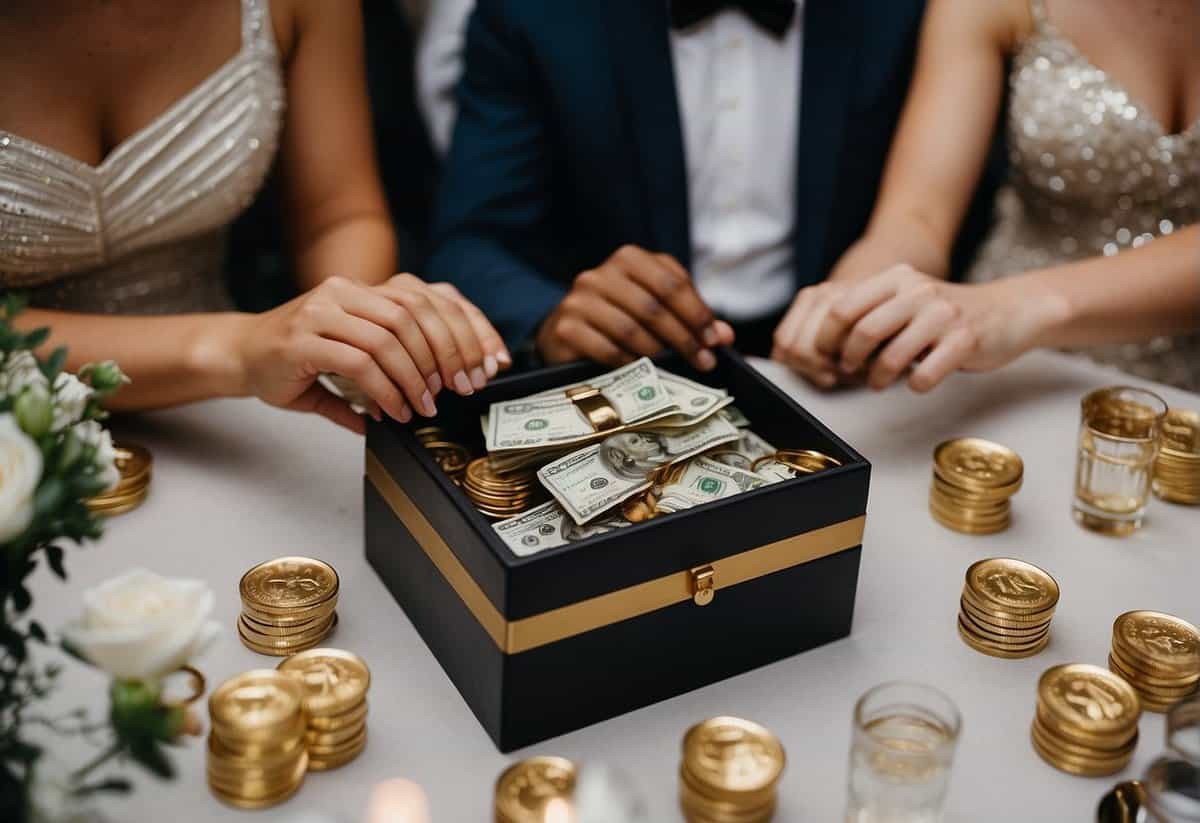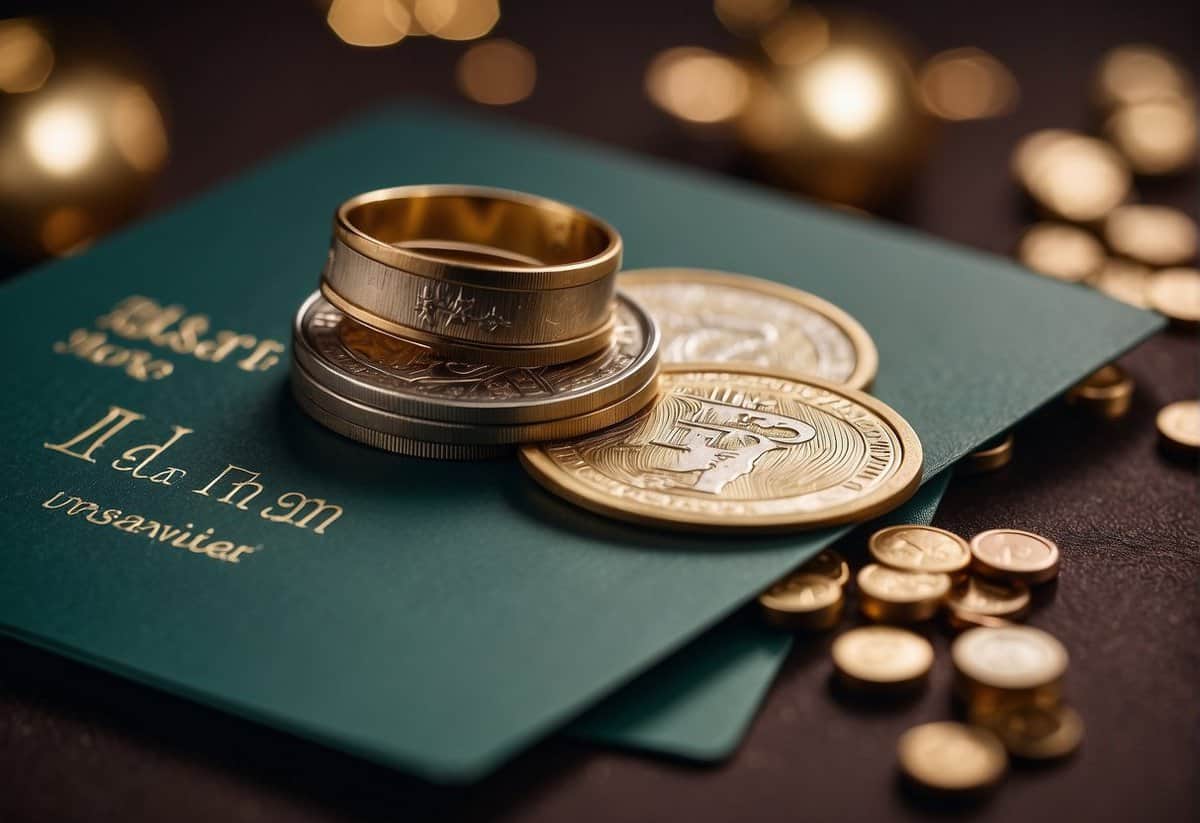Is It Normal to Give Money at Weddings? Understanding Gift Etiquette
Attending a wedding often comes with the question of what gift to bring. While there are many options, giving money as a gift has become a popular and acceptable choice. It’s a practical way for the couple to start their new life together, especially as they might be saving for big purchases or experiences. Many cultures consider monetary gifts at weddings customary, and in some cases, it is even preferred over traditional presents.

There isn’t a one-size-fits-all answer, as the amount of money you might choose to give can vary widely based on a range of factors. These can include your relationship to the couple, your personal financial situation, and cultural or regional norms. The intent behind giving money should always be to aid and celebrate the couple on their special day, not to adhere to a perceived obligation or standard. Therefore, it is important to give an amount that you feel comfortable with and that reflects your wishes for the couple’s future.
Key Takeaways
- Money has become a favored gift option for weddings.
- The appropriate amount to give varies based on personal factors.
- Giving should be heartfelt, aligning with your comfort and relationship with the couple.
Understanding Wedding Gift Traditions

When you’re invited to a wedding, choosing the right gift can often involve navigating through a mix of traditions and modern expectations. Here, we’ll explore the historical aspects of wedding gift-giving and examine the current trends between giving money and selecting items from a registry.
The Role of Tradition in Wedding Gifts
Traditionally, wedding gifts were tangible items that helped newlyweds establish their new home. Gift etiquette suggested that you would select a traditional gift, like a piece of kitchenware or linen, to contribute to the couple’s future household. These wedding gifts were a form of support, reinforcing the community’s role in helping the couple begin their married life together. Over time, the prevalence of wedding registries has made it easy for guests to select the perfect gift that fits within the couple’s specific needs and preferences.
Traditions can vary greatly across different cultures and regions. In many places, traditional gifts might include hand-crafted items, family heirlooms, or specific objects meant to bring good luck and fortune. When considering gift etiquette, remember your familiarity with the couple’s specific cultural traditions can guide your gift choice.
Cash Gifts Vs. Registry Items
In modern weddings, especially in cases like a destination wedding where transporting gifts can be impractical, giving money has become an increasingly acceptable and appreciated gift option. According to The Bridal Tip, many cultures now view monetary gifts as a way to contribute directly to the couple’s new life, be it through helping to pay for the wedding itself or funding future plans.
-
Cash Gifts: Often seen as more flexible, cash allows the newlyweds to allocate funds as they see fit. Whether it’s used to pay down a mortgage, go on a memorable honeymoon, or simply to cover wedding expenses, cash presents them with the option to use it according to their most pressing needs.
-
Registry Items: A wedding registry acts almost as a wish list created by the couple, helping ensure that gifts are both wanted and needed. When selecting a registry gift, you’re purchasing something you know the couple has already expressed interest in, which can make your contribution feel more personal and thoughtful.
It’s important to weigh these options in light of your relationship to the couple. For instance, a close family member might opt for a more substantial monetary gift or a significant item from the registry, while a coworker or a distant relative might select a smaller registry item or give a modest cash gift. Remember that in the end, your presence at the wedding is what truly matters, and your gift is a symbol of your support for the couple’s future together.
Determining Your Gift

When you’re invited to a wedding, it’s traditional to offer a gift to the happy couple as a symbol of your support and affection. The amount you give can be influenced by several factors, including your closeness to the couple and your own financial capacity. Let’s explore how to gauge an appropriate wedding gift amount that respects both your budget and relationship.
Relationship With the Couple
- Close Friend or Relative: If the bride or groom is someone you’re particularly close to, such as a best friend or sibling, it’s customary to give a bit more. The average wedding gift amount typically falls at around $200 for those nearest to you.
- Acquaintance or Colleague: For those who are not as intimate, such as work colleagues or distant relatives, a lesser amount is completely acceptable. Generally, a gift in the range of $100 to $150 is seen as ample.
Budgeting for the Gift
- Assess Your Financial Situation: Before deciding on the gift amount, take a good look at your current budget. It’s important to only spend what you can comfortably afford.
- Average Cost of a Wedding Gift: Keeping in mind the general ballpark figure can help you orient your budget. On average, wedding guests spend about $160.
Remember, giving money as a wedding gift should be thoughtful and reflective of your individual circumstances. Your presence at the wedding is fundamentally what matters, and any gift is a welcome gesture of kindness.
Gift Etiquette and Protocols
When attending weddings, you’ll often encounter a series of events leading up to the big day and decisions around the appropriate type of gift. Whether it’s a cash gift or an off-registry item, understanding wedding gift etiquette ensures your contribution is both thoughtful and appropriate.

Attending Multiple Events
If you’re invited to the engagement party, bridal shower, and the wedding reception, it’s customary to bring a gift to each. A good approach is to vary your spending according to the event’s formality, giving more at the wedding itself. For example:
- Engagement party: Consider a smaller gift like a card or an engagement gift that celebrates the couple’s new journey.
- Bridal shower: This is often the time for more personal or household-related gifts—think gift cards or items on the registry.
- Wedding: A check or cash wedding gift is commonly given at the reception, aligning with your budget and closeness to the couple.
When managing your budget across these events, a helpful distribution could be 20% of your total gift budget for the engagement gift, 20% for the bridal shower, and 60% for the wedding gift.
Navigating Plus-One Scenarios
If you receive a wedding invitation with a plus-one, it’s considerate to account for that additional guest in your gift.
- Single attendees: A range of $75 to $200 is standard for a wedding gift, with the actual amount depending on your financial comfort and connection to the couple.
- Couples: When attending as a duo, it’s appropriate to increase the gift value, ensuring it reflects the inclusion of your plus-one.
It’s always polite to send a gift even if you can’t attend the wedding. You can utilize the couple’s registry or opt for sending a gift card if you’re unsure of what to purchase. If giving a cash gift, including it with a heartfelt card can add a personal touch. Remember, timely giving is key—sending your gift too late may seem like an afterthought.
Practical Considerations for Giving Money

When deciding to give money as a wedding gift, it’s important to consider how to present it and manage logistics for safety. Money can be a welcome alternative to traditional gifts, providing couples flexibility in its use, whether for their honeymoon fund or as foundational support for their new life together.
How to Present a Cash Gift
- Envelope: Choose a decorative envelope or a money holder card to place your cash gift in. It’s a simple yet elegant way to present your contribution to the couple’s future.
- Amount: If you’re unsure how much to give, consider that guests often give amounts ranging from $75 to $200, depending on their relationship to the couple and financial capability.
- Personal Touch: Including a heartfelt note can personalize your gift, making it memorable.
- Registry Consideration: If the couple has set up a cash fund in their registry for specific goals such as travel or lodging, contributing directly there is also an option.
Addressing Logistics and Safety
- Peak Season Caution: Weddings during peak season may lead to a high volume of gifts. Ensure your card doesn’t get lost by handing it to a designated person or placing it in a secure spot, like a card box.
- Shipping: If you’re unable to attend the wedding, especially if there’s travel involved, provide a cash gift through a secure platform or a check in the mail. This way, you avoid the risks associated with sending cash directly.
- Off-Registry Gift: If you opt for an off-registry gift, be mindful of the couple’s plans. A cash gift can alleviate the stress and expense of shipping or receiving large, physical gifts during a busy and transformative life event.
- Plus One Etiquette: If you’re attending with a plus one, consider increasing your gift to account for the additional guest.
Remember that giving money as a wedding gift is not only acceptable but can be a thoughtful way to contribute to the couple’s future endeavors.
Frequently Asked Questions

When you’re invited to a wedding, it’s common to grapple with the question of what to give, especially if you’re thinking of giving cash. Here’s a clarity on the norms and expectations around monetary gifts.
How much is customary to give as a cash gift for a wedding?
The customary amount can vary widely depending on factors like your relationship to the couple and regional customs. A starting point is often in the range of $50 to $150, but it’s best to consider what you’re comfortable with and your personal connection to the couple.
What is considered a generous cash gift at a wedding?
A generous cash gift can be anything upwards of $200, with some choosing to give more depending on their financial capacity and closeness to the couple. Remember, what’s generous can be subjective and situational.
Is giving cash as a wedding gift still a popular choice?
Yes, giving cash is a popular choice and often appreciated by couples for its flexibility and practicality. In many cultures, cash gifts are traditional and welcomed.
What should you write in a card when giving money as a wedding gift?
When giving cash, it’s nice to include a heartfelt card. Your message should express your best wishes, perhaps with a personal touch or a hope for their future together. Keeping it sincere is key.
How much should you give for a wedding gift if you are not able to attend?
Even if you’re not attending, sending a gift is a considerate gesture. An amount that you’d normally spend on a night out, like $50 to $75, can be a fitting guideline, depending on your budget.
Does the amount of cash to give as a wedding gift differ for close family members?
Yes, close family members sometimes give larger amounts, as relationships can inform the generosity of a gift. It’s often about personal discretion and knowing what might be expected within your family.


